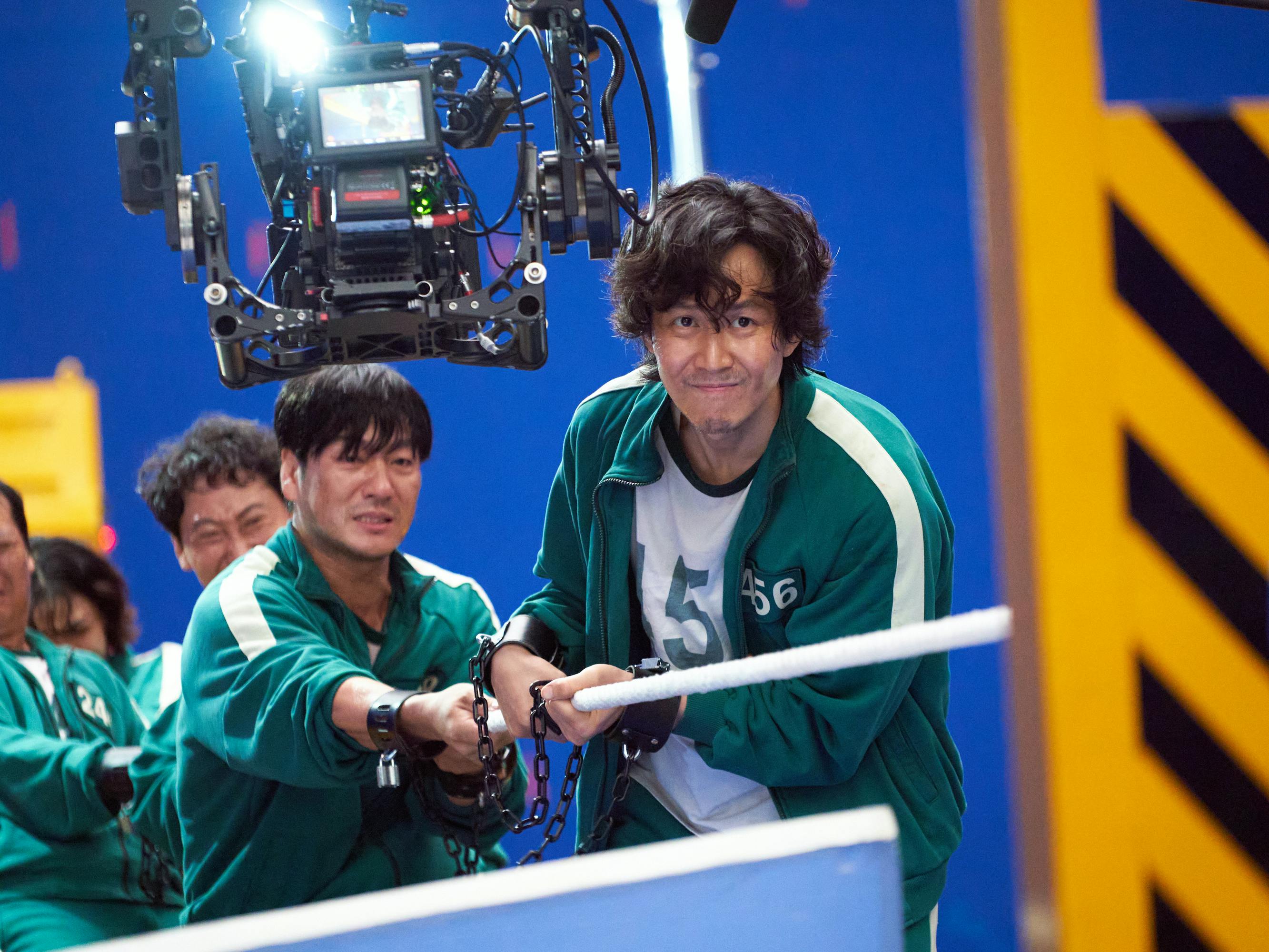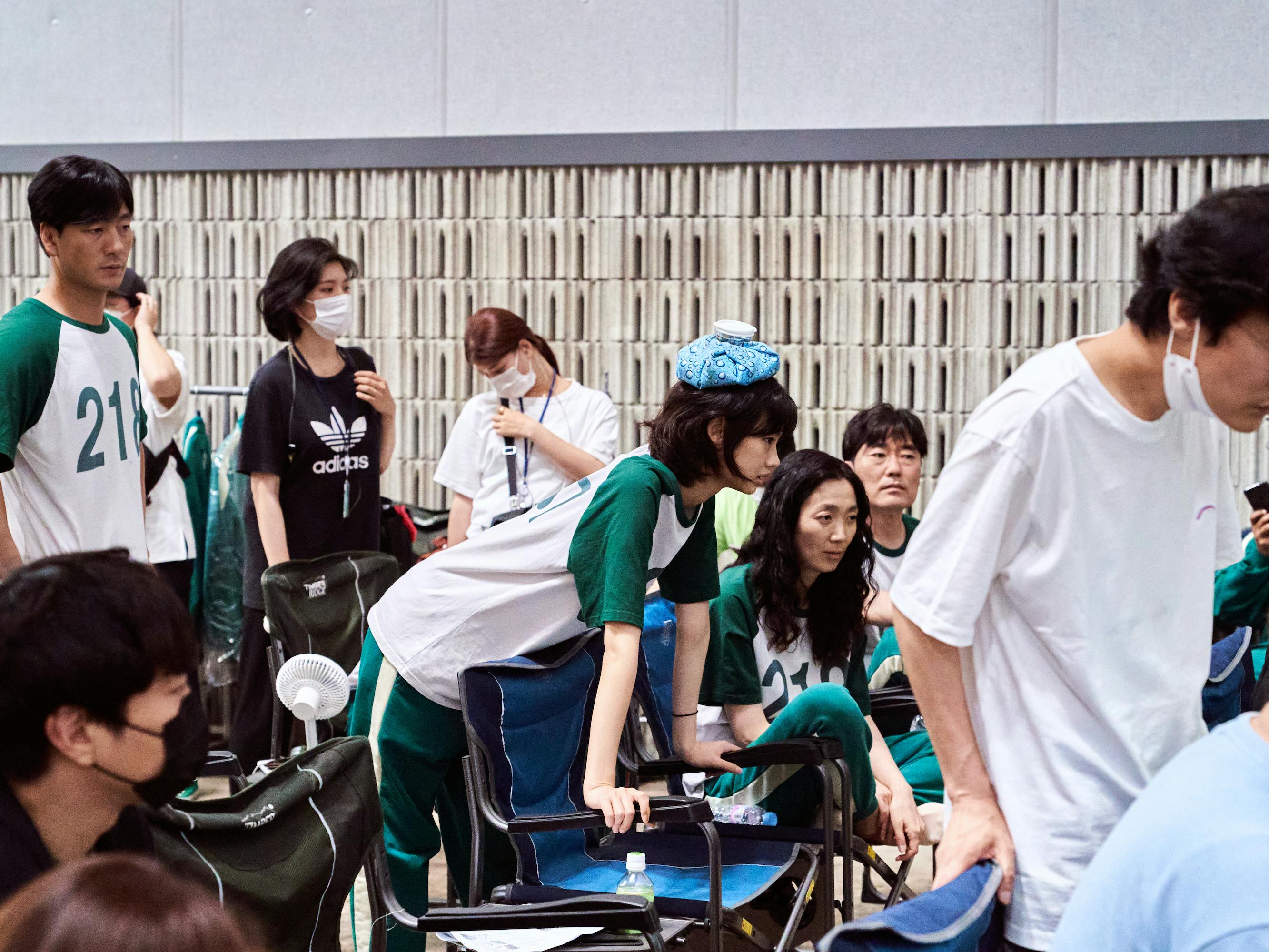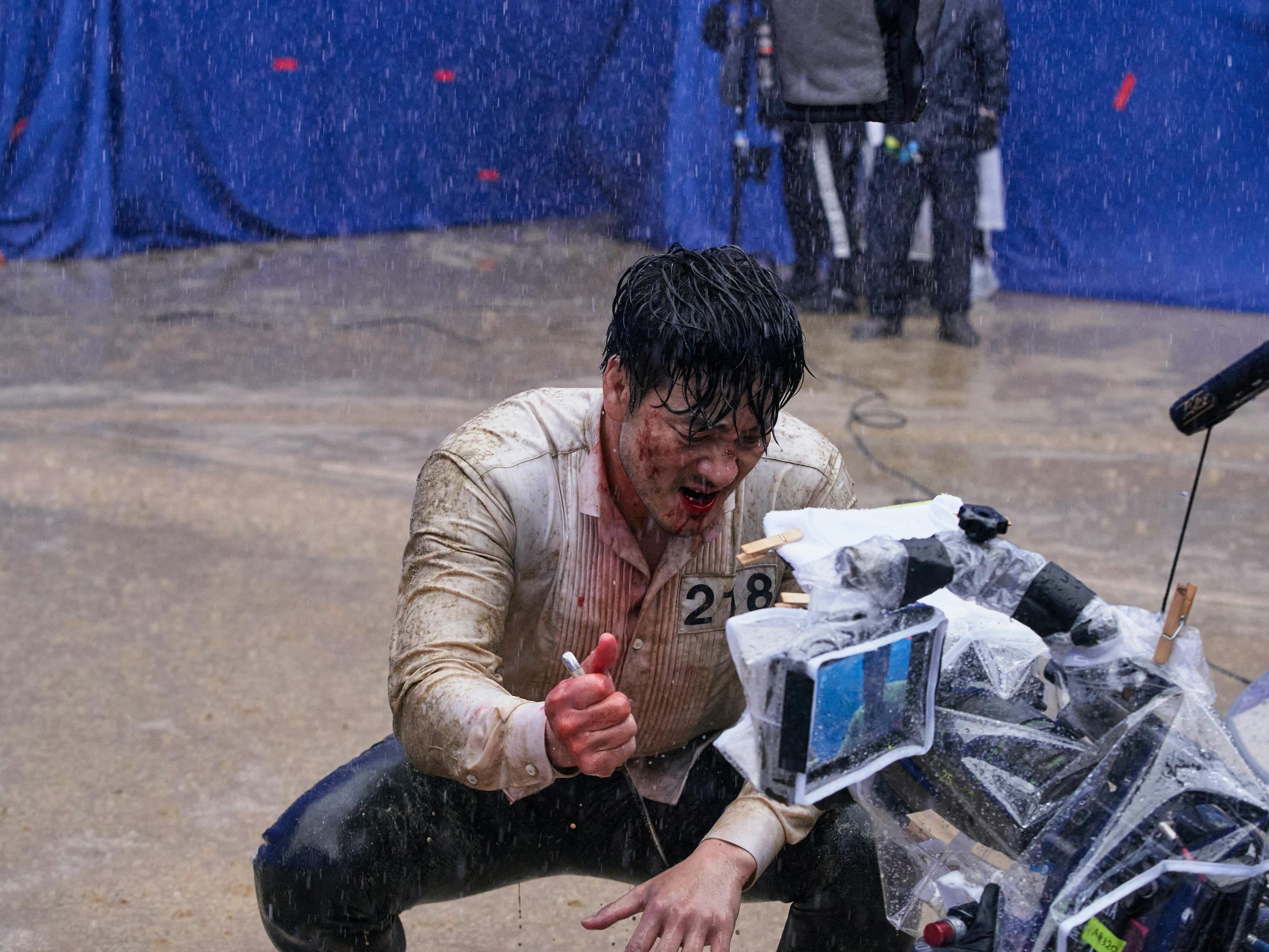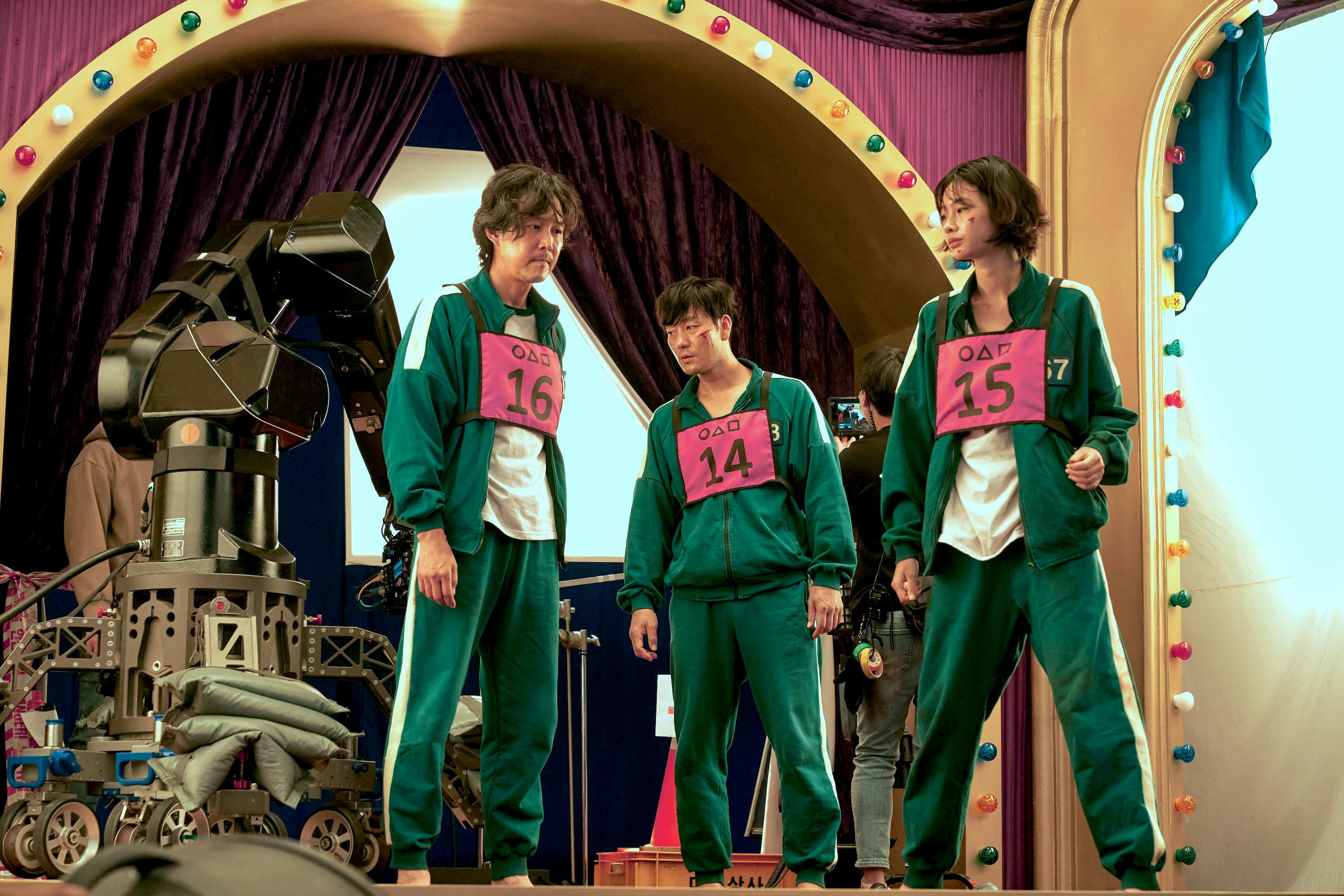The heart and humanity of Squid Game.
Korean series Squid Game seemed an unlikely contender for instant international success to director Hwang Dong-hyuk (The Fortress, Silenced), who initially wrote the screenplay as a movie in 2009. “I wanted to write a story that was an allegory or fable about modern capitalist society, something that depicts an extreme competition, somewhat like the extreme competition of life. But I wanted it to use the kind of characters we’ve all met in real life,” he explains. Convinced it would be too unfamiliar and possibly too violent for a global audience, director Hwang put the project on the back burner while he went on to make three other features. But 10 years later, he moved forward with the concept, and its universal message has resounded with audiences around the world.
If you’ve yet to watch the series, 456 down-on-their-luck contestants are plucked from their ordinary lives, dropped into a secret location, and asked to play children’s games — Red Light, Green Light, marbles, and eventually the titular Squid Game. “Squid Game is a childhood pastime that took over the alleyways in the 70s and 80s when Korea’s economic growth was on the rise,” says director Hwang of his title. “It was the most violent and competitive of physical games beloved by kids during that time. Seeing that everyone in today’s society is pushed into extreme competition, I decided to use the name of the game.” Unlike the typical playground spoils of candy or bragging rights, the stakes in the show’s competition are high: Losers are killed and the last person standing wins 45.6 billion won (around 38 million U.S.D.). Over nine stressful and visually astounding episodes, players connive, betray, and form alliances — it’s hard to look away.
Squid Game is now Netflix’s biggest show ever. Since rising to number one in 97 territories and drawing 142 million viewers in its first month, the industry has taken notice: Oh Young-soo, who portrays Player 1, Oh Il-nam, was awarded a Golden Globe, and stars Lee Jung-jae and Jung Ho-yeon earned Critics Choice and Screen Actors Guild Awards. Recently, director Hwang and actors Jung-jae, Lee You-mi, Park Hae-soo, Oh, and Jung received landmark Emmy nominations for their work. Across the board, the series has garnered 14 nominations, including for Outstanding Drama, becoming the first non-English series to ever do so. In fact, it’s the first non-English show to be nominated in a major category at the SAG Awards and the Golden Globes.
Squid Game has captured the international zeitgeist, leaping from the screen to our social media feeds and text chains with lightning speed, offering entertainment and depth in equal measure. In its short lifespan, the show has inspired countless memes, recipes, and Halloween costumes. From the newfound popularity of the participants’ teal tracksuits to the Wonka Bar-esque craze of dalgona candy, Squid Game has left an indelible umbrella-shaped stamp on our collective culture — so much so that a reality competition based on the show, Squid Game: The Challenge, is now in the works.
As kids, we love backyard childhood games, like those featured in Squid Game, for the amusement, not the outcome. As adults, we strive to get ahead. Squid Game reminds us of what we lose when we’re so focused on who ends up on top. “Rather than the game itself, Squid Game focuses on how [participants] act and how they respond,” says director Hwang. “Usually, we look at the winners in survival games but in Squid Game, we look at the losers. Without losers, there are no winners.”
Beyond the dichotomy of winner versus loser, though, viewers will find an unparalleled exploration of human nature. For all its brutality, Squid Game has heart. The competition involves moments of greed and selfishness, to be sure, but also radical acts of empathy that resonate long past the credits. Like when Han Mi-nyeo, also known as Player 212, offers Jang Deok-su, Player 101, her smuggled lighter during the dalgona game, quite literally saving his life. Or when one player gifts another his only cob of corn as a token of appreciation. Flawed as the characters might be, many choose kindness.

Cho Sang-woo (Park Hae-soo) and Seong Gi-hun (Lee Jung-jae)
In some ways, this altruism is a recipe for winning: a notion that’s on full display in the game of tug-of-war, where working as a whole can save an entire team from falling to their deaths. No player is left behind. “These bonds reveal a deeper truth: that individual success is a myth,” culture critic Morgan Ome writes in The Atlantic. “No one who survives does so on their own, but because of the sacrifices of others.” It’s an unlikely message from a show about deadly competition, but one that has ensured its critical success. Jung-jae echoes this sentiment, telling the New York Times, “Squid Game is not really a show about survival games. It’s about people. I think we pose questions to ourselves as we watch the show: Have I been forgetting anything that I should never lose sight of, as a human being? Was there anybody who needed my help, but I was unaware of them? Should I have helped them?”
To add another level of interest, contestants play Squid Game’s life-or-death games of their own free will. After their initial capture, the players leave and go back to their ordinary lives, and are given time to contemplate the opportunity. More than half decide to return to the games of their own volition, which lends to the greater philosophical point behind the show. As director Hwang says, “These participants are trying to survive, like many people trying to do the same in today’s world. The show tries to convey the message that we’re not that removed from the participants of this survival game, and on top of that, the possibility that we, too, may be beholden to this future.”
Everywhere from Qatar to Ecuador, viewers rooted for their favorites, learned the players’ harrowing backstories (and the origins of the game), and asked themselves the inevitable question: What choice would I have made in the Squid Game? The survival genre — stories of human struggle against all odds — is one we love to watch; films like Cast Away and The Midnight Sky have long captured the human imagination. Squid Game begs comparison to William Golding’s 1954 novel Lord of the Flies, as both stories contemplate societal issues, foregrounding gore and rivalry against a backdrop of childhood play and singalongs. Director Hwang became interested in such juxtaposition while reading game-based comics: “I thought of the irony of having to risk your life playing simple, childhood games you enjoyed with friends back in the day. That is how I started writing the scenario for Squid Game: the irony of having the most beautiful memory turn into an ugly, terrible reality.”
Squid Game displays an eye-catching aesthetic, “dreamy, like a fantasy,” as director Hwang puts it. Scenes often reference well-known works of art, like Edvard Munch’s The Scream or Michelangelo’s The Creation of Adam. At one point, artist Judy Chicago’s monument to women’s accomplishments The Dinner Party is made over with dark context. A pastel-colored labyrinthine stairway evokes M.C. Escher and Ricardo Bofil as contestants march toward their next game. Other large-scale sets resemble idyllic playgrounds and Seoul neighborhoods, designed to blur the line between reality and fantasy. Guards’ red suits, with black masks adorned with sharp geometric shapes, stand in stark contrast to the soft playful pastel locations, reminding players and viewers alike of the bloody consequences of losing.

Along with the striking visuals, the brilliant cast has given us both new and familiar talent for which to root. The competitors at the center of the series all come from different walks of life — a petty criminal, a chauffeur, an investment banker, a forgetful old man — but have been chosen because of the one trait they share: debt and a desire to risk their wellbeing to transcend poverty. As we learn characters’ often tragic reasons for staying in the game, we become endeared to them, and to the actors who play them.
Jung-jae, who plays Seong Gi-hun, a chauffeur and gambling addict, has starred in movies like The Thieves and Svaha: The Sixth Finger. Park, who plays Cho Sang-woo, Gi-hun’s childhood friend and a secretly disgraced investment banker, can also be seen in Prison Playbook, Persona, and most recently, Money Heist: Korea. But Korean model Jung, who plays devoted older sister Kang Sae-byeok in her first onscreen role, has quickly become a fan favorite. A runner-up on Korea’s Next Top Model, her Instagram has climbed from 410,000 followers to 23.2 million (and counting), making her one of the most-followed Korean personalities.

Cho Sang-woo (Park Hae-soo)
The visuals are striking and the games are nightmarish, plucking us out of our own world and into Squid Game’s apocalyptic one — but all throughout, the questions of morality, of doing the right thing, hit close to home. Like the very real characters of Squid Game, we are all flawed, but we all have the right intentions: to be kind to one another and to do better each day. Director Hwang says of the show, and perhaps of our world today, “The only thing we can depend on is each other and our humanity. That is our last hope.”
As Squid Game so successfully proves, humanity can still shine through in a game of life and death. It might even be what gets you to the finish line. Viewers and critics alike continue to flock to the show for this unique vision. And the games have only just begun — filming for Season 2 is currently underway.




